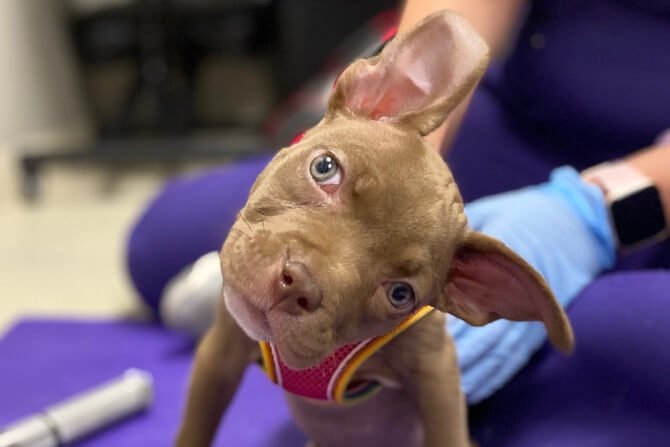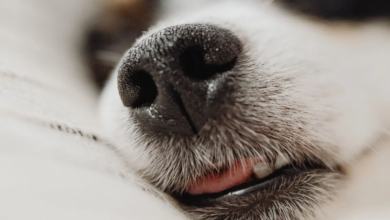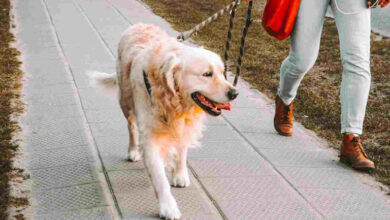Vestibular Disease in Dogs

Have you ever noticed a dog that appears to be drunk? The dog may be dizzy and falling over to one side. The head and eyes may be in an unusual position. The dog may be vomiting as well. These signs are consistent with vestibular dysfunction. What happens when your dog has a vestibular problem?
What Is Vestibular Disease in Dogs?
Vestibular disease occurs when there is a problem with the vestibular system. The vestibular system is a part of the nervous system that controls balance and eye movements. It includes the inner ear, the brainstem, a part of the brain called the vestibulocerebellum, and a cranial nerve in that area called the vestibulocochlear nerve. The vestibular system enables animals (including humans) to maintain balance and orient themselves according to head position. It also allows their eyes to follow movement without getting dizzy. FEATURED VIDEO seconds of 2 minutes, 11-second volume 0% How to Clean Your Dog’s Ears
If one or more of these areas becomes impaired, the dog will exhibit signs of vertigo and is considered to have some form of vestibular dysfunction.
Signs of Vestibular Disease in Dogs
- Ataxia (drunkenness/dizziness/loss of balance)
- Inability or unwillingness to stand or walk
- Falling to one side
- Head tilt (usually to just one side)
- Nystagmus (rapid involuntary eye movements)
- Nausea and/or vomiting
- Facial drooping or paralysis
- Horner’s syndrome (a combination of signs that affect just one eye)
Most dogs with vestibular dysfunction will first appear drunk and disoriented. This is because they experience vertigo due to the problem in the vestibular system. Vestibular disease is sometimes misinterpreted as a stroke, but this is not commonly the cause.
Causes of Vestibular Disease in Dogs
Vestibular dysfunction occurs when there is a disturbance in the vestibular system. The problem may originate in the inner ear, the brain, or both. There are several possible reasons why this might happen.
- Inner/middle ear infection (inflammation causes damage to the sensors in the inner ear)
- Tumor or cyst pressing on a nerve or other essential part of the brain or inner ear
- Trauma/injury to the brain and/or inner ear
- Hypothyroidism (a common disease but an uncommon cause of vestibular dysfunction)
- Vascular accident or stroke (an uncommon reason for vestibular disease)
- Idiopathic vestibular syndrome
Idiopathic vestibular syndrome is sometimes called “old dog vestibular syndrome.” This refers to vestibular disease with no known cause. It is most common in senior dogs and typically resolves on its own.
Check also: DOG EAR CONTAMINATION – SIGNS AND REMEDY

Treatment of Vestibular Disease in Dogs
Treatment options for vestibular disease depend on the reason for the problem.
In the case of idiopathic vestibular syndrome, treatment involves supportive care until the signs resolve on their own. Anti-vertigo medications like meclizine are often prescribed along with anti-nausea drugs. The treatment is similar when the cause was a stroke or vascular accident.
Dogs that have experienced trauma to the vestibular system may improve with supportive care (like those with the Idiopathic vestibular syndrome). Some are candidates for surgery to repair the damage. Hospitalization with intensive care may be needed during recovery.
If the vestibular disease is secondary to hypothyroidism, the vet will begin thyroid supplementation. Supportive care may be needed at first until the medication begins to work.
If the dog has an inner or middle ear infection, then the treatment may involve ear medications and/or oral medications to eradicate the source of the infections (often bacteria and/or yeast overgrowth). Dogs may have debris in the ears that must be removed under general anesthesia.
Tumors and cysts are usually diagnosed after advanced imaging like CT or MRI. In some cases, surgery can be done to remove the tumor or cyst. If a cancerous tumor is present, chemotherapy and/or radiation may be recommended.
How to Prevent Vestibular Disease in Dogs
Unfortunately, there is no sure way to prevent vestibular problems in dogs. If your dog is prone to ear infections, then regular ear cleaning with a vet-approved cleanser can help keep ear infections from developing. Annual or biannual veterinary exams and lab tests can help your vet detect subtle changes before your dog develops vestibular dysfunction.
If you notice signs of vestibular disease in your dog, do not wait for it to go away. Bring your dog to the vet as soon as you can. The sooner the underlying cause is found, the faster your dog can get proper treatment.











